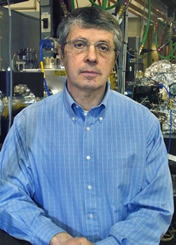

|

|
IN MEMORIAM
Daniel Chemla
Professor of Physics
UC Berkeley
1940 – 2008
Daniel Chemla died, surrounded by family members, at his home in Kensington, California, on March 20, 2008. He had suffered a stroke four years earlier, and had subsequently battled a series of health problems. Chemla was 67 years old.
Born in Tunisia on July 21, 1940, Chemla received his undergraduate degree at l'école Nationale Supérieure des Télécommunications in Paris, France, and his graduate education at the University of Paris. He received his Doctorat ès Sciences in 1972. He then worked at the Centre National d’études des Télécommunications as a member of the technical staff, group leader and department head, conducting research on nonlinear optics in dielectric materials, organic molecules and crystals, and compound semiconductors.
In 1981, Chemla joined AT&T Bell Laboratories in Holmdel, New Jersey, where he initiated research on optoelectronics in semiconductor quantum wells and superlattices. In 1983, he became head of the Quantum Physics and Electronic Research Department. In 1991, he accepted a joint appointment as professor of physics at the University of California, Berkeley, and director of the Materials Sciences Division. In July 1998, he also became director of the Advanced Light Source at the Lawrence Berkeley National Laboratory (LBNL). He played an invaluable role in building connections between LBNL and the Department of Physics, and he was an energetic teacher and mentor to many students.
Chemla’s scientific interests were in diverse light matter interactions, from semiconductors to organics, from bulk materials to single molecules, spanning time and space scales down to femtoseconds and nanometers. Early in his career he used group theory to formulate very useful general molecular design rules for nonlinear optical materials. His investigations of the optical properties of quantum confined structures, other low-dimensionality materials and strongly correlated systems are seminal. He demonstrated that quantum size effects alter the properties of such systems, and in particular, that many body interactions are size- and shape-dependent, unlike those of either atoms or macroscopic solids.
Chemla was known among colleagues and friends not only for his science, but also for the fact that he earned the rank of godan or fifth degree black belt in karate, the highest rank awarded in Shotokan Karate of America. He had studied karate since age 15. In a 1997 interview, he explained that karate and the physical sciences are alike: “What we are trying to understand is the world, and us in the world. The process is very similar in the sense that understanding is extremely artistic, intuitive. But in order to select what is right and what is wrong, we must confront nature.”
Chemla touched the lives of all who knew him, through his amazing leadership skills. He led by personal example, influencing many by his unique approach to science, teamwork, friendship, and life itself.
Chemla was elected a member of the National Academy of Sciences and a fellow of the American Physical Society. He was also a member of the Optical Society of America and the Institute of Electrical and Electronic Engineers. In 1988, he received the R. W. Wood Prize of the Optical Society of America, and in 1995 the Quantum Electronics Award of the IEEE Laser and Electro-Optics Society and a Humboldt Research Award. In 2005, on the occasion of his 65th birthday, he was awarded an honorary doctorate by the École Normale Supérieure in Cachan, France. In the same year, a special issue of the journal Chemical Physics was published with the title: “Molecular Nanoscience — In Honour of Daniel S. Chemla on his 65th Birthday.”
Chemla is survived by his wife Berit; two children, Yann, an assistant professor of physics at the University of Illinois, Urbana-Champaign, and Britt Chemla Jones, an art history lecturer in Houston, Texas; and four grandchildren: Sebastian, Teo, Lukas and Liliane.
Maria Hjelm
John Clarke
Shimon Weiss